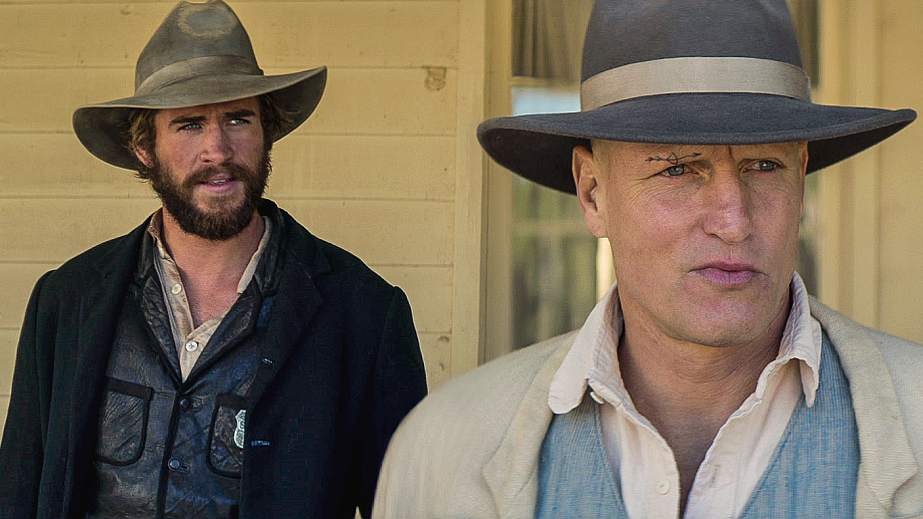Kieran Darcy-Smith’s revisionist western The Duel isn’t so much interested in the visual grammar or history of the genre it’s plundering, but rather in exploiting the influences of masculinity, racism, and religion that held dominion over frontier America. The film’s most modern gesture is its implicit suggestion that these influences pervade today, that misogyny, false prophets, and a tendency to dehumanize other cultures still find plenty of favor in the Promised Land.
The Duel begins with a prologue set in 1846, in the town of Helena, Texas. Abraham Brant (Woody Harrelson) wins a brutal knife fight in the pouring rain, the dead man’s young son standing over his mud- and blood-stained corpse. Flash-forward twenty-two years and the boy is a Texas Ranger—David Kingston (Liam Hemsworth), who’s been tasked with investigating some mysterious murders (and the disappearance of a Mexican general’s niece) in a small town near the Rio Grande. The man thought to be responsible is none other than Abraham Brant. Kingston accepts his mission, insisting to his wife Marisol (Alice Braga) that he has no personal vendetta to settle. She’s satisfied, but only on the condition that he agrees to bring her with him.
https://www.youtube.com/watch?v=riLmGF-c0yI
David and Marisol arrive to find a kind of police state—Abraham refers to himself as the town’s “ethereal council,” but his function is more that of a dictator, one who’s managed to make an entire township complicit in his nefarious activities. However, it’s not so much Abraham’s muscle that’s secured him this position as it is his power over the mind: he’s been nicknamed “The Preacher,” and he gives fiery sermons in the town church that sound an awful lot like today’s huckster self-help guides. Harrelson nails the contradictions of this character—his piety and his violence, his amiability and his vitriol. Abraham is a capitalist and an evangelist; he’s There Will Be Blood’s Daniel Plainview and Eli Sunday in one man, and he’s just as self-serving as both.
The Duel is at its best focussing on the character of Abraham, and the evil he justifies by his closeness to God (we eventually learn why it is that wealthy Chinese and British men come to this town in droves… it’s certainly not for the scenery). And the film is most interesting when it suggests that this brutal figure’s spiritual endowment might not be phony: using only the palm of his hand and the serpent with which he sermonizes, Abraham is able to infect Marisol’s mind, drawing her helplessly to him; meanwhile, many in the town attest to his powers of faith healing. That Abraham’s supernaturalism is never explained challenges our own disbelief.
Abraham is a capitalist and an evangelist; he’s There Will Be Blood’s Daniel Plainview and Eli Sunday in one man.
Less engaging are the portions of The Duel that focus on its altruistic protagonist, who is, true to his giant-slaying biblical namesake, a traditional kind of hero. Hemsworth’s subdued, subtly intelligent performance lends more weight than is probably on the page, but as a character David is merely thrust into the places where the plot needs him to be—which is usually the wrong place at the wrong time. David also serves a purpose as an embodiment of disillusioned idealism: he thinks he’s in control once Abraham makes him sheriff of their tiny town, but the loss of his wife’s loyalty briefly causes him to reckon with powers greater than himself.
For a while, Darcy-Smith’s western seems to be wrangling some big questions about the American character—our relationship to religious thought, to charismatic leaders, and to morally compromised nationalism. Unfortunately, the last act of The Duel is more interested in vigilante justice, and a particularly macho and bloodthirsty form of it at that. There’s still a guiding conscience—in his meting out of punishments, David is most harsh toward the bigots and misogynists that cross him—but nuance is largely lost in the body count. FL









